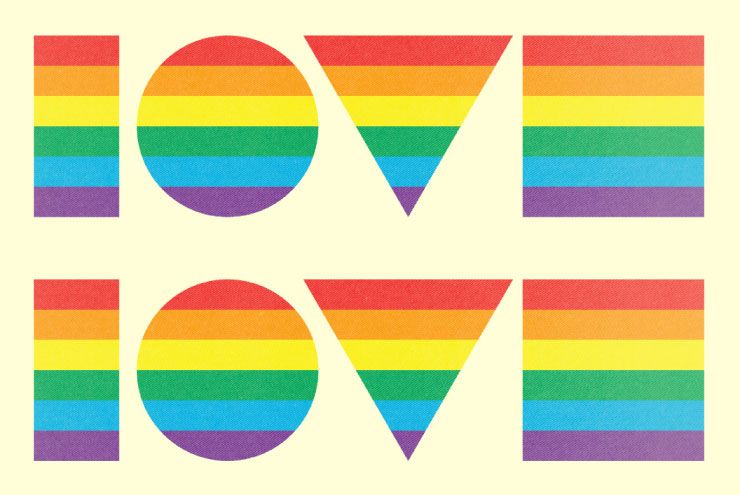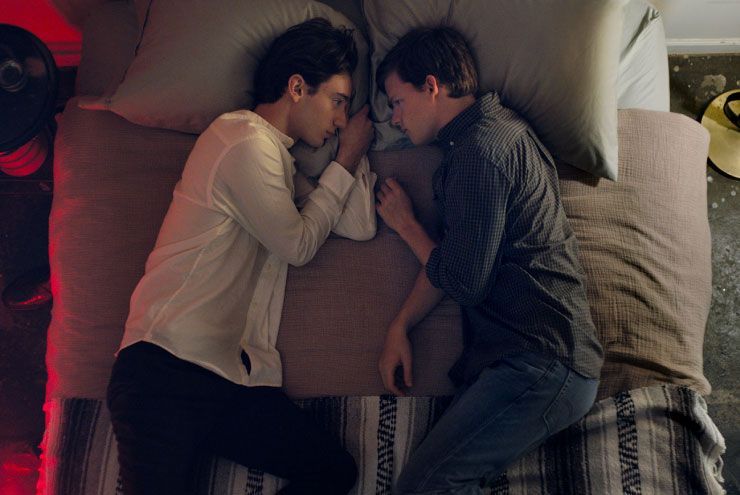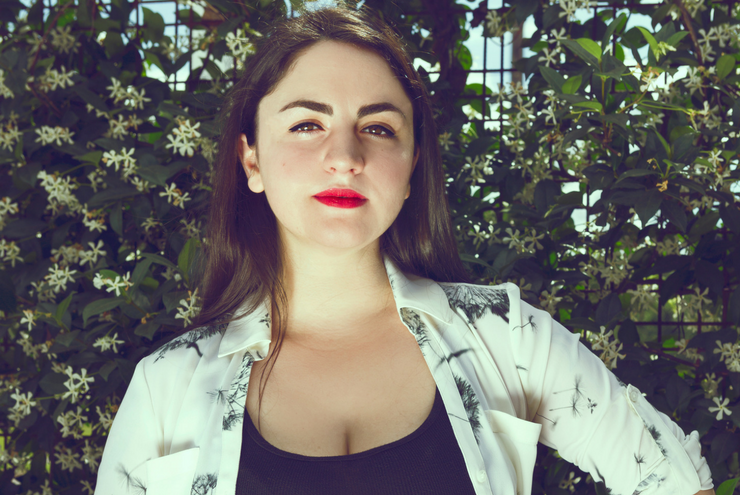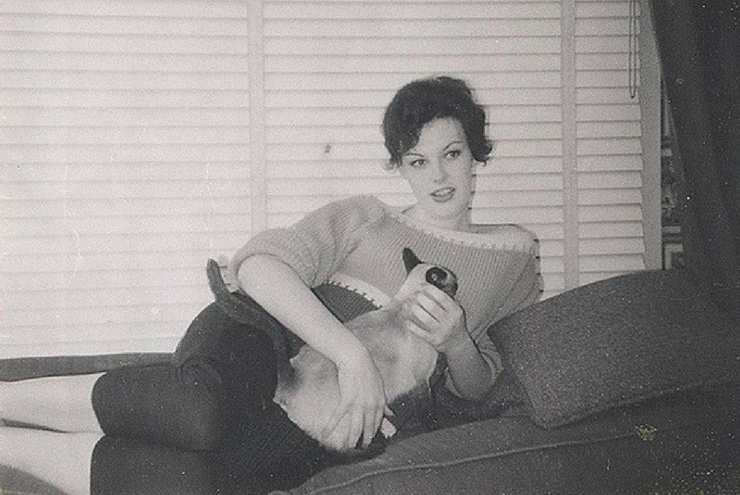By Kirk Loftin
Hey,
I don’t know you personally, but I know what you’re going through. As your social media walls fill up with rainbow flags and public displays of wonderfulness, the word “Pride” dominates all month long. But, as a queer person, for whatever reason, you don’t feel like you have a part. Maybe it’s because you don’t feel “queer enough,” struggle with imposter syndrome, tell yourself that Pride isn’t for someone like you, that it’s only for the “real” queer people. Maybe you’re in a hetero-appearing relationship, or you don’t genderbend enough, or you’ve never felt invited into the LGBTQ family. Maybe you’re new to the family and don’t feel like you’ve “earned” a place yet. Or maybe you just don’t know how to join the festivities.
I know these pains, because they are my pains, too. When I came out as a teenager, my parents weren’t supportive. One even told me, “I don’t think I can love you anymore.” It was said in the heat of the moment and I don’t believe they even remember saying it, but I remember. You can’t forget that kind of pain. Growing up in a very strict Christian, conservative home, I had nowhere to turn for community except to queer films which were, by default, horrifically depressing. Seriously: Boys Don’t Cry, Philadelphia, Milk, Brokeback Mountain, Monster. The only exception I found at the time was The Birdcage, a movie I love very much, but seemed so foreign to me, as though it could easily be a fantasy set in a different universe.
An unaccepting home and a dearth of happy LGBTQ representation led me to feel trapped in my feelings of anxiety, fear, and otherness. It wasn’t until college that I was able to reach out. I found the LGBTQ student organization online and went to buy a T-shirt at their fundraiser (that I then hid in my closet, all irony lost on me). I was only on campus certain days, so I couldn’t go to their meetings that semester. But starting the next semester, I scheduled my classes to make sure I would always be on campus, so I could take part. I didn’t just find a fun club, I found a family of people who didn’t judge me, who accepted me, and most importantly, who loved me. After a single semester, I ran for vice president of the LGBTQ student organization and, to my shock, I won. I was vice president for a year. That next year, after the president of the club graduated, I ran for president myself—and won that too. I was elated! While it had been a rocky election (nasty rumors had spread), I was able to put it all behind me after my victory.
That is, until the group split the next semester into two groups: pro-me and anti-me. After one of the nastiest times of my life, I resigned as president, and left college at the end of the semester, feeling utterly rejected.
The very group that had allowed me to finally feel queer had kicked me out (or so it felt). Part of it was that I wasn’t gay, but bisexual (I identified that way at the time, but I’ve since realized I’m pansexual). I was told by members of the group that I wasn’t “really gay,” and that I fit the phrase “bi now, gay later.” In a group that supposedly prided itself on inclusion, acceptance, and love, I was being told I didn’t belong, that I wasn’t “enough,” and that I would never fit in. While I was vice president, I started dating a non–binary genderqueer person (who was assigned female at birth). It was used as “proof” that neither of us were “real” in our identities.
After getting forced out, I felt banished, not just from the group, but from the whole LGBTQ community. I withdrew, no longer going to events, distancing myself from former friends, and isolating myself. The final nail in the coffin was when my partner and I split up. My identity had been so entwined with my partner’s for so long, that it felt, with the dissolving of our relationship, my queer identity went with it. I walked away from all of it. I knew (and never denied) that I was a queer man, but I felt stranded on an island, completely removed from the mainland queer experience.
After that, I didn’t date men, I didn’t participate in queer politics, I stopped going to Pride, and I definitely didn’t go dancing at gay clubs. I walked away from all of it. And because of my isolation, I got further and further away from feeling a part of the LGBTQ family. It hit the point where I told one of my best friends, “Sure, I’m queer, but it’s not like it even matters.”
I stayed like that for a few lonely years, and then the Orlando Pulse shooting happened. I stayed glued to the TV, watching the news non-stop. As more and more details were revealed, I realized how connected I felt. I had gone dancing in clubs just like that. These people were just like us, just like my best friends, the people I love the most in the world. What finally broke me was when Anderson Cooper read the names of all the deceased, one by one, along with a personal detail about each. He cried as he forced his way through it, and I sat on the couch bawling. These were my people. I needed to reconnect.
Shortly after, Pride happened. I made it a point to go. I didn’t have a car, so I had to take the bus to get there. None of my friends went, so I ended up spending the day alone, walking in circles, people-watching all the fabulous queer folks looking beautiful and happy (albeit very overheated). After the first couple of hours of sensory overload, colors and loud music and beautiful people being awesome, a loneliness sunk into my bones. Although surrounded by scores of people, I was all alone. I knew no one. As the day progressed, I felt more and more depressed, eventually telling myself I was alone because I didn’t belong. “Sure, you’re queer, but you’re not Queer,” I told myself.
Just before the parade, a trans woman friend texted to say that she was there and wanted to meet up. As she pulled me to the crowd gathering to watch the parade, I panicked. I don’t belong here. I’m not worthy. I’m not a real queer person, I’m too terrified to even try to date men. She’s a real queer person, Pride is for people like her, not people like me. Mental illness took over (I didn’t know at the time, but I’ve since been diagnosed with bipolar disorder) and I explained I had to leave. She looked disappointed and I felt guilty, which just made me feel worse. I walked the mile or so to the nearest running bus stop, which wasn’t in a very safe area. Out of fear of some kind of hate crime, I took the rainbow beads from around my neck and hid them in my pocket. I rode the bus home, wrecked by a mixture of guilt, fear, and sadness.
I didn’t go back to Pride last year. I stayed home, again, feeling that I didn’t belong. I started to regress again, isolating myself from the community and from my own identity. Because, no matter how real it was, it didn’t feel real. After years of hiding from my parents, hiding from myself, from my ex-partners and friends, and from the LGBTQ group that ran me away, I wasn’t even sure of who I was. I had worked so long to make sure my wrists weren’t too limp, that my posture wasn’t too effeminate, that I didn’t accidentally say something “gay” in the wrong company, that I hit a point, now in my late twenties, where I didn’t even know what was natural for me, how I was supposed to be. That’s a scary place and that fear drove me away, again.
Earlier this year, I saw the movie Love, Simon. Although I could talk about that wonderful movie for hours, the reason I bring it up is this: Even though I loved that movie (cried four times)—it was happy and beautiful and for once, we got a happy ending—it hurt me in a very real way. The movie showed me the life I missed, a life I will never have. The queer kid trying to find his way around dating, the tearful hugs from parents who say they still love you. I’m so happy that movie exists for young queer kids now (I could have really used it 13 years ago), but it also reminded me that I didn’t have that kind of message when I needed it most, telling me that it was okay, I wasn’t a freak, and that in the end, things will be better.
I was in college when the “It Gets Better” video movement happened. Although I really loved the message, I never made a video myself. I felt the videos should be authentic and the bottom line was, I didn’t feel that it would get better for me. My queer identity tended to bring a lot of hurt and very little fulfillment.
So, I understand. You have no clue how hard I feel what you’re feeling right now. Even now, at almost 30, I’m too terrified to ask a guy who I like out. It used to be a mixture of not feeling queer enough and feeling inexperienced. But those feelings have snowballed over the years to what seems like an insurmountable wall. When I listen to queer dating experiences, I realize that I’m basically the non-marshmallow piece in Lucky Charms, and nobody like those pieces. I am still letting fear define who I am and what I do.
I’ve let fear run my life for far too long. I know things are so incredibly scary, but in the end, inaction leads to a much scarier life. I know what you’re thinking, “Why should I listen to you, when you’re a bigger chicken than I am?” That’s precisely why. Learn from my mistakes. Don’t let fear take the steering wheel in your life. I get that things like Pride can be scary, especially when you don’t feel very “proud.” But fuck that fear. Go. If you have someone, even just an ally friend for support, ask them to go with you. If you have to go alone, then go alone! Even if you feel alone, you aren’t. It’s a massive gathering of people who accept you, who love you, and who understand you. Luckily, what happened to me was a long time ago and I’ve seen that things have been changing.
Don’t let other people define you. Only you can do that. If you don’t feel you belong at Pride, believe me when I say you absolutely do. Believe me when I tell you that you are queer enough, you do belong, and most importantly, you are loved. If by no one else, then by me, because I know exactly how you’re feeling. You’re not alone.
So, go to Pride. Maybe you’ll see me there and we’ll lock eyes, joined in anxiety, but united in our struggles against fear. We won’t let the negativity win, because that’s precisely what Pride is about. You are you, whatever sexual orientation, gender identity, or whatever else it is that makes you you. And that’s beautiful, because you’re beautiful. I’m able to tell you this because I’m also telling myself this. Fear is natural, but it doesn’t have to be in charge. Pride is for you, just like Pride is for me. There aren’t qualifications, there isn’t a checklist you have to fill out. If you want to go, it’s for you, whether ace, or trans, or pan, or bi, or gay, or lesbian, or non-binary, or genderfluid, or anything else that belongs in our wonderful queer family.
I’ll see you at Pride, friend. And this year, on the bus ride home, I’ll be the one with rainbow beads around my neck.
Love from a fellow scared queer kid,
Kirk








Suzie
June 22, 2018 at 12:22 PMYou are not the non-marshmallow piece and I love you for articulating so many specific feelings!